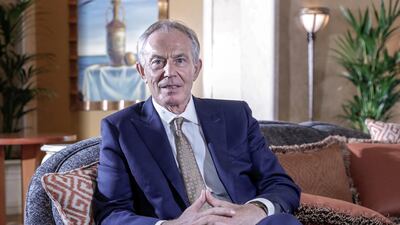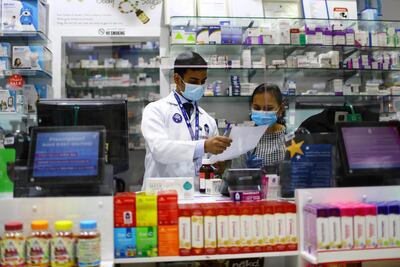“Test, test, test.” The words of Tedros Adhanom, Head of the World Health Organisation (WHO), could not be clearer: testing will get us out of this crisis.
Earlier this week, I co-authored a paper with colleagues at the Tony Blair Institute for Global Change. We focused on the efforts of the UK's public health body which, whilst admirable, were still struggling to scale testing to the levels needed.
Our Executive Chairman, former UK Prime Minister, Tony Blair, had previously called for mass testing to be rolled out across the United Kingdom, suggesting that this was the essential component of any plan to beat the global Covid-19 pandemic.
His contribution established consensus around why we need testing.
This week’s paper – captured in a foreword from Mr Blair – began to answer the question of “how”.
UAE's massive testing
For Britain, many answers lie elsewhere. As detailed in the paper, there is much to be learned from the approaches of other countries such as South Korea, Singapore and Iceland, but perhaps none more so than the UAE – they have, after all, established the world’s largest testing facility outside of China and took just 14 days to process “population-level” testing.
That’s tens of thousands daily and equivalent to 22,900 tests per million people — one of the highest in the world.
The country’s success lies in its efficiency and inventiveness.
Rather than rely on lab-based swab tests – an approach initially adopted by others – the UAE quickly recognised the need for making testing convenient and easily accessible.
This is best exemplified by the launch of a drive-through testing facility, making the UAE the fifth nation in the world to implement this service and the first nation in the Gulf to do so.
By providing results within hours, the facility rapidly speeds up the time it takes to test patients and we know this is vital to curtailing the spread of the virus. The quicker an infection is discovered, the faster its spread can be traced.
Tracing and treatment
Indeed, tracing is a vital part of any testing strategy. Antibody tests – those that tell us if a person has had the disease and is now immune – have intrinsic value as they inform who can become economically active without fear of infection. Meanwhile, antigen tests tell us if someone has the disease.
This informs treatment and isolation, but when coupled with tracing, it becomes an exit strategy from lockdown.
If we can find out who an infected patient has been in contact with, we can then inform them, isolate them, and do the same with their contacts.
It’s a formidable approach as it means that vital services and economies can continue to function.
There is much to learn from the UAE in this regard and the country can be proud of its thorough contact tracing – including one instance where a single person was found to have infected 36 others.
The WHO has made its views on testing very clear. The UK is taking this direction and we have seen excellent work taking place across Public Health England – the country’s body overseeing the Covid-19 response – along with a clear commitment to ramping up testing from the UK Government.
They are working incredibly hard. Adopting the ideas from our work - such as introducing a senior Minister for Testing and providing easy access for new testing suppliers – would help, but leaders would do well to look at what has taken place in the UAE.
The country should be very proud of how quickly it has mobilised and rolled-out testing, answering Mr Adhanom’s rallying cry and helping to contain the global outbreak.
Ryan Wain is a Strategic Adviser at The Tony Blair Institute for Global Change


